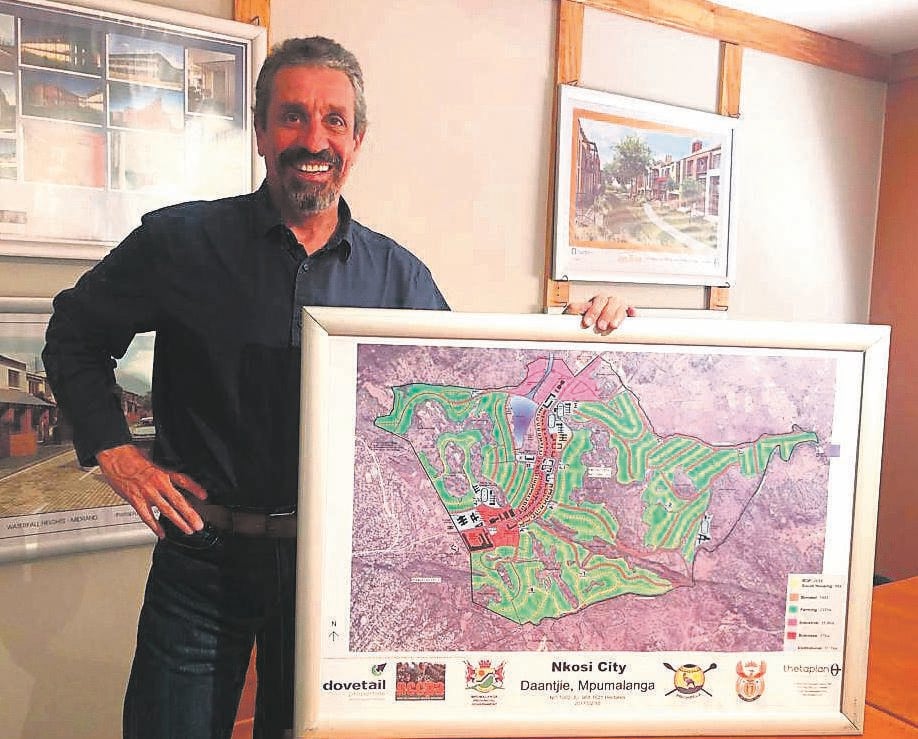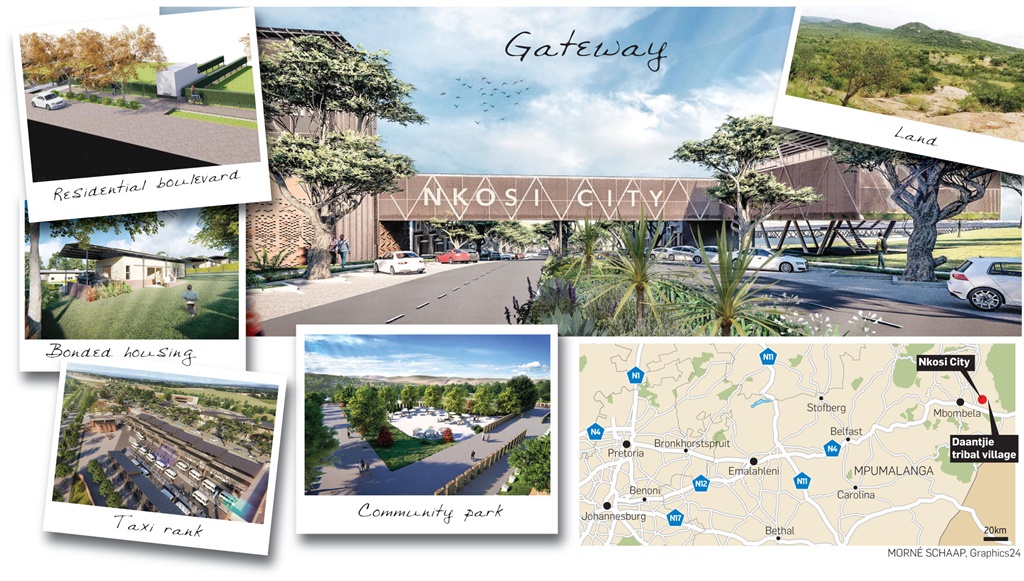
After 10 years of planning and dreaming, three men are close to achieving their goal – an ‘agri-city’ for the future in Mpumalanga.
Nearly a decade ago, property developer Philip Kleijnhans, traditional leader Sicelo Nkosi and then ward councillor in the city of Mbombela, Mpumalanga, Mandla Msibi, stood on a bushy piece of land – a picture of a future city unfolding in their minds.
The communal land bordering the Daantjie tribal village, about 35km from Mbombela and 3km from the Kruger National Park, remains as bushy as it was then, and livestock still graze there.
However, one thing is different.
The trio’s dream is now a concrete plan on paper and most signatures have been appended, with the development of the R7.8 billion project set to start next year.
As such, by early February, a new “agri-city” called Nkosi City – the one these men were visualising back then – will start being built.
This is going to be a game-changer that will see the wealthy and the poor living as neighbours. The rural Daantjie community will have equal shareholding through the Nkosi City Communal Property Association with Dovetail Properties.
Kleijnhans, the director of Dovetail Properties and the man who has been spearheading the plans for the multibillion-rand city, told City Press this week that all the important boxes had been ticked:
- The department of rural development and land reform has donated 968 hectares of land under the custodianship of the chief, Nkosi;
- The Mpumalanga department of agriculture and environment has issued an environmental authorisation;
- The Mbombela Local Municipality is on board and a township establishment process is being finalised; and
- The New Development Bank will finance infrastructure development of the private residential areas.
Nkosi City’s layout map occupies a prominent space on the wall of Kleijnhans’ office in Johannesburg.
On his desk lies a 225-page document titled Nkosi City, An Agri-City.
This document contains all the details – from the layout of the city (water reticulation and electricity) and artist impressions to agri-city precedents (examples of similar buildings elsewhere) and other details.
It shows that the whole plan is now ready for implementation.
“In January, it will be exactly 10 years since I stood on site with the chief and Mandla [who is now Mpumalanga’s co-operative and traditional affairs MEC],” Kleijnhans said.
He added that the project would be completed by 2026. But what kind of city is this?
It will have 1 747 RDP houses, 1 166 upmarket apartments, 558 bonded houses and an estate for the wealthy.
It will also include amenities such as a 50 000m2 shopping mall, a private clinic, schools and an iCollege, and a private further education and training college.
Right now, Daantjie is a haphazard former homeland settlement built in KaNgwane. It is a mishmash of modest and posh houses interspersed with small businesses.
Pot-holed roads and an erratic water supply tell a story of deteriorating service delivery. The residents travel to Mbombela for shopping and services.
“This is not just another integrated human settlement with RDP houses sitting on [top of] each other. Initially, it was just a human settlement project, but something evolved in my mind and, three years later, I knew how to do it,” Kleijnhans said.
That thing, he said, was agriculture.
“Men [here] usually go to work in the cities and send money home. The women remain behind, so I thought that next to each RDP house there must be a 2 500m2 vegetable garden. A top agricultural company is involved to mentor them and a marketing group for these vegetables has been secured. It’s a sophisticated agricultural project ... products will be processed on site, and packaged and refrigerated,” Kleijnhans said.
Macadamia and citrus trees, instead of “pretty trees”, will be planted along the streets as part of the agricultural initiative.
“This is an agricultural project,” said Kleijnhans.
“It will provide an income of more than R300 million for women living there over three years.”
The city will improve the lives of 264 000 people, 7 000 households and create 15 000 jobs, according to a market study.
It is envisaged that 30 to 40 small, medium and micro enterprises will be set up to reduce the staggering 62% unemployment rate in the village.
The design of the buildings will also be different, Kleijnhans said.
“The roofs float free from the walls to keep the houses in shade. People deserve a modern, green agrarian city like that, especially in the hot Lowveld region,” he said.
City of Mbombela spokesperson Joseph Ngala said all the stakeholders were tying up a few loose ends before giving the developer the green light.
“Nkosi City is the first of its kind in the Mbombela municipality. This development will help improve our economy. We aim to eradicate unemployment, which is a serious crisis. This project comes with such benefits to our community,” Ngala said.
The Nkosi City document introduction gives a clue as to where the three men might have drawn their inspiration from – the Bakoni ruins.
Archaeologists and historians who have studied the Bakoni people – a group who occupied the Mpumalanga area from 1500 to the 1820s – talk about an amazing aerial view of the stone-walled city’s ruins that break the grass cover on hillsides and valleys near Ohrigstad and Carolina.
These structures are set in bewildering mazes of stone ridging linked by stone passages. Some are quite sparse and intermittent; others are dense, continuous and intricate with paths, roads and terraces.
Evidence found in these ruins shows that the Bakoni people were not only practicing rudimentary forms of subsistence farming, but were involved in intensive farming, which allowed for the cultivation of plants in rich volcanic soil on the hillside of the escarpment.
“About 100km from the Nkosi City development lies one of the many Bakoni ruins – ruins of an ancient southern African agrarian city,” reads the document.
“In the time of the Bakoni, the landscape hosted a civilisation that turned to her for sustenance and refuge by furrowing deep into her base to excavate stones for homes and irrigation terraces; and deep into her soils for produce to feed families and trade resources.
“Today, the ruins of this civilisation have left a landscape of mystery, reminiscent of a once utopian African city familiar to many, but lost to modern South Africa.
“We now draw inspiration from this ancient city, as Nkosi City strives to be the modern African agri-city; meeting the economic goals of a developed city, while acknowledging the deep roots of the African civilisation into her landscape.”
Kleijnhans said he first got involved with the project when the City of Mbombela saw the way he worked with communities and asked him to come up with a project for their municipality.
The rest is history.
TALK TO US
Nkosi City has been 10 years in the making. Is this the template for future cities in SA?
SMS us on 35697 using the keyword NKOSI and tell us what you think. Please include your name and province. SMSes cost R1.50. By participating, you agree to receive occasional marketing material
 |
| ||||||||||||
| |||||||||||||




 Publications
Publications
 Partners
Partners









